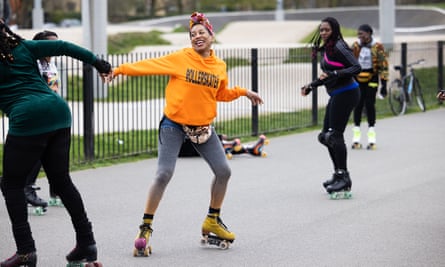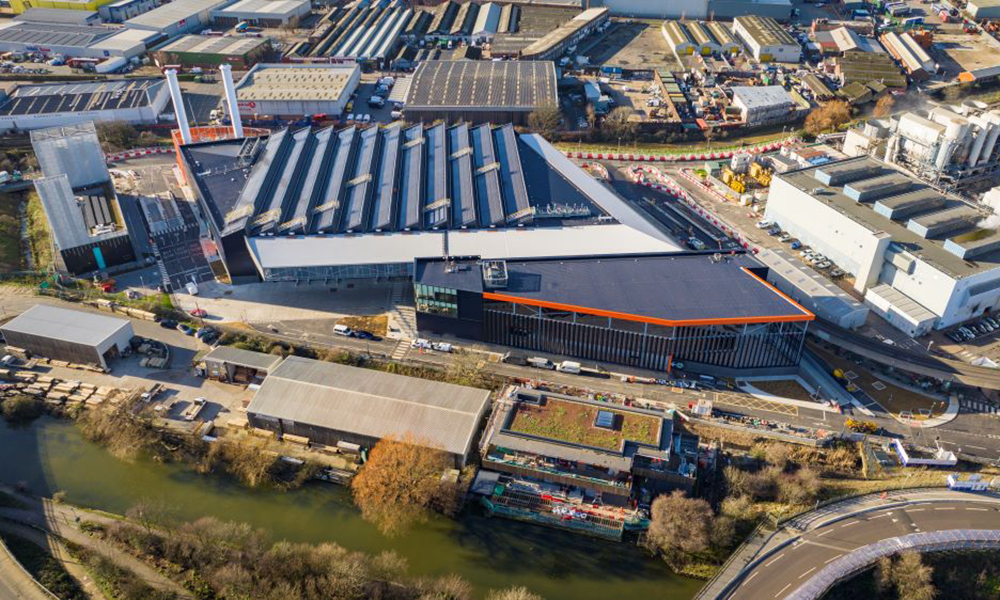
Burgess Park is not the most beautiful park in the UK. To be honest, it’s not even the most beautiful park in its own corner of south-east London. One friend accurately described its charms as like an “unfinished late-Soviet-era public space in suburban Łódź”.
Given its main feature is neither a garden nor a lido, or a playground, but a bridge that goes nowhere, there are few people who would debate this. It is not the biggest park, nor is it the coolest park or the park with the best vista . It is, however, the most extraordinary.
Burgess Park is an extraordinary park because of how it is used. Most parks in British cities were carved out from former countryside, somewhere to momentarily forget you were in the city. Burgess Park, however, emerged from bombed-out streets and paved-over canal. It is impossible to escape from the city here. Rather, it is of the city, and used as such; in Burgess, you find the whole of teeming London.
And up until 2020, in the summer, you would have found a cross-cultural barbecue scene that would rival anywhere in Europe.
In 2011, Southwark council did something that is almost unique in any big UK city and approved the use of permanent barbecues in a section of the park. Disposable barbecues are a blight on public green spaces, drying out grass and causing fires, but this was a proactive step to give the local community something they could use safely.
And use it they did. Almost instantly, the park became home to a thriving barbecue culture, particularly among the African, Caribbean and Latin American communities adjacent to its borders. This wasn’t sausages and burgers on a Tesco box, but jerk chicken, large rumps of picanha, ribs, suya, eaten and shared in groups of dozens. Santiago Peluffo, co-director of the charity Latin Elephant, called it “the closest possible experience to an Argentinian asado in London”. There was a sense while walking through the barbecue area, to the sound of reggaeton, Afrobeats or bullerengue, not just that you weren’t in London, but that you might not even be on the same continent.
Yet since 2020, the barbecue area has not reopened. It was closed by Southwark council during the pandemic to stop gatherings of people, but summer after summer it has been cordoned off, without a public consultation being held. Up and down the country, the pandemic has been used as an excuse to accelerate closing off access to space without due process, turning what should be a commons into an enclosure – as in the recent case of Primrose Hill, in north London, which now shuts at night supposedly to stop “antisocial behaviour”.
The explanations at Burgess Park have been similarly flimsy, ranging from air pollution to risk of fires (even though the lack of facilities is pushing people to use more dangerous disposable methods). What is clear is that despite accidentally creating it, the council seems almost embarrassed about how much of a success the barbecues became.
Roller skating in Burgess Park. Photograph: Graeme Robertson/The Guardian
Maybe food and parks were never really designed for each other. British park culture has been, and still is, influenced by the Victorians, who saw them as places to improve the moral (and physical) rectitude of a population consumed by the sins of urban life. There is a baked-in paternalism to this view of parks; when Alexandra Park opened in Moss Side, Manchester, in 1870, it was not just to “cope with the promenading of large numbers of persons”, but also to “deter the working men of Manchester from the alehouses during their day off”.
Yet parks have become a place for those excluded from the “commercialisation and privatisation of urban space” to wrest back a sense of control over the city. Alexandra Park later became the site of the Manchester Women’s Suffrage demonstration and is now where the Manchester Caribbean carnival takes place. At Burgess, you can walk into a forum on Colombian elections, get conscripted into a salsa class, or come across a barbecue to raise funds for Windrush scandal victims. Many of the people who eat in the park are those without their own gardens, and who are prohibited from taking up space on pavements and public squares.
Over the past few months, I’ve been attending events organised by We Walworth, a partnership aiming to bring together residents with the council to raise and take action on local issues, and talked to people within the park itself. The desire for the barbecues to return has been palpable and a working group including local people, community workers, ward councillors and local and central government civil servants developed a plan for a staged reopening. Southwark council, meanwhile, has put up notices announcing that the current barbecue area is to be dismantled.
Some of the objections I’ve heard have merit – the barbecues attract litter and noise – but others have talked of feeling “intimidated and excluded” by the mass use of the barbecues, a phrase I have seen echoed on neighbourhood apps such as Nextdoor, with more racialised and classist language.
There have been proposed solutions about how to better include people who weren’t using them before, but this seems to me a fundamental misunderstanding on what a commons should be. In Burgess, you can run, cycle, play tennis, dance, use the BMX track, sit by the lake and fish, or be part of a Latin fiesta. The fact that not all of these appeal to everyone isn’t a weakness – it is the very definition of public space.
Rather than trying to ignore it, or snuff it out, this is an opportunity for councils up and down the country to learn from what’s happened at Burgess Park. If you build things that people need, people will use them. The solution isn’t to make concessions to those who were never going to, but to help those who already are – give people more bins, more toilets, more things they need to feel they have some ownership over the space. As the then mayor of Manchester, John Grave, said at the opening of Alexandra Park more than 150 years ago:“The people have made it, the people have paid for it, and the people will use it.”
https://www.theguardian.com/commentisfree/2023/jun/17/extraordinary-barbecues-council-shut-them-down-london-burgess-park





